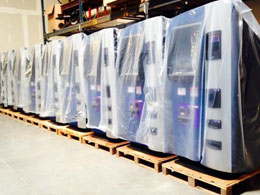
What's New to Your Wallet? Here Come the Bitcoin ATMs
Actually, automatic teller machines (ATMs) for Bitcoins have already been around for a little while; the first in the world started operating in Vancouver, Canada in the fall of 2013. Up until now, though, those in the United States wanting the convenience of an ATM for managing their Bitcoin accounts were out of luck, unless they were prepared to make a considerable road trip.
That's about to change.
On Thursday, February 20, the first Bitcoin ATM in the US was turned on in HandleBar, a tavern in downtown Austin, Texas. Robocoin, the company that manufactures and installs the machines, has plans to expand to Seattle, Washington and Alberta, Canada within the near future, and—once international transaction licensing hurdles can be cleared—they will install them in locations throughout Europe and Asia, as well.
Robocoin's CEO, Jordan Kelley, recently told CNN the new machines will be a
“...huge breakthrough when it comes to bringing accessibility to the consumers.”
Currently, Bitcoin investors and traders must rely upon an Internet connection and a computing device—be it a smartphone or laptop computer—in order to make transactions with their cryptocurrency.
The ATMs are poised to be a game changer as far as that is concerned, Kelley told Tech Crunch:
“Robocoin is completely removing Bitcoin’s barriers to entry and helping bring Bitcoin into the real world.”
Industry experts and digital currency investors alike are welcoming the good news, especially in the wake of exchange software issues and wildly fluctuating markets. Cryptocurrency resource website Coin Pursuit's Founder and CEO, David Forrest, put it this way: “Some days it's like the Wild Wild West out there, and that's exactly the reputation the industry doesn't want.” It is hoped, he added, the ATMs will add legitimacy to the burgeoning digital currency markets.
Forrest makes a good point; since Bitcoin's introduction in 2009, it—and other types of cryptocurrency such as Litecoin and Peercoin—has struggled to be considered “real money” in the public eye. Since digital currencies are unregulated and have no central financial agencies or governments behind them, there are laypeople and financial experts alike who regard the field with suspicion.
If the ATMs are accepted and embraced by the public, it could mark a major step toward the acceptance the industry eagerly seeks.
“They [the ATMs] would help the average consumer see what investors already know: Bitcoins are just as acceptable as the dollar bills in your wallet,” Forrest added.
In their recent article on the subject, Reuters noted that—out of necessity—a small degree of user anonymity will have to be sacrificed in order to use the new machines. The ATMs “have scanners to read government-issued identification such as a driver's license or a passport to confirm users' identities,” the news agency reported. Cryptocurrency advocates like to point out that one of the industry's best features allows investors and traders to remain anonymous; the currency itself is identified by encrypted codes, but not its user. It remains to be seen if those users who value their anonymity—and guard their sensitive personal information closely—will have issues with that.
Installing an ATM will not be a simple case of plugging the machine in, either. In the Tech Crunch article cited above, they noted potential owners will need to get an official Money Transmitter License (MTL) or register their location as a Money Service Business (MSB). Coin Pursuit's Forrest believes this won't be an issue.
“They [business owners] will like the potential draw that being on the cutting-edge of technology will give them. They'll be good for business.”
Coincidentally, Coin Pursuit is headquartered in Austin Texas—the same city that boasts the first Bitcoin machine in the US. “It's cool,” Forrest commented. “We need more.”
Robocoin's Kelley would likely agree—and more ATMs certainly seem to be in the works. Robocoin's Kelly summed up his view of the industry in general when he told Tech Crunch,
“...Bitcoin is here to stay, just like the internet. We think governments will look to regulate this emerging economy and will identify and support the businesses that are prepared to play ball.”
For the most up-to-date resources and information in the digital currency industry, please visit http://www.CoinPursuit.com/
Related News





